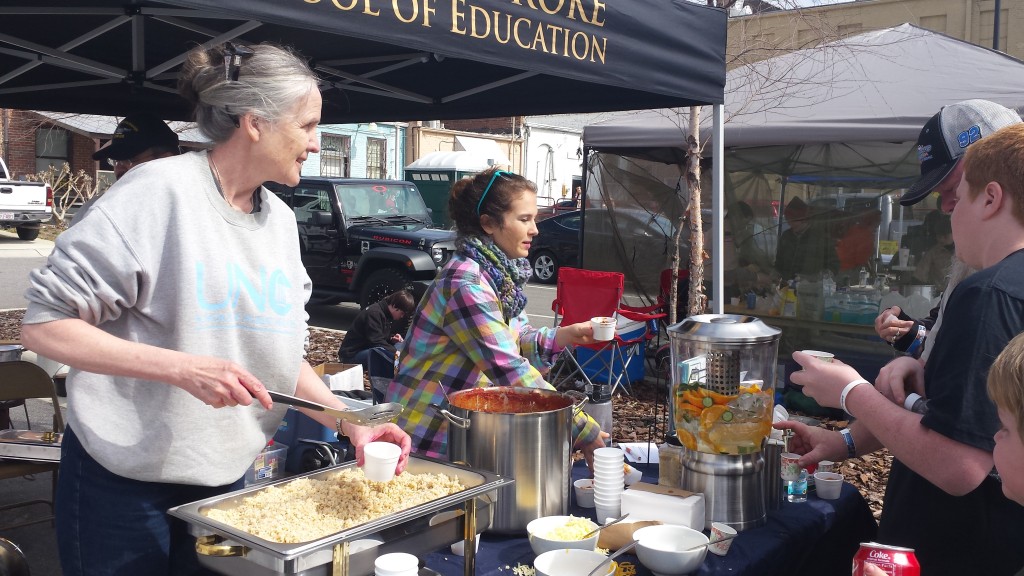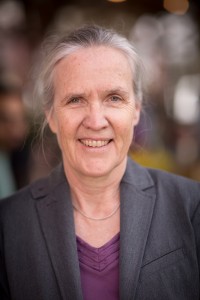Food For All
May 5, 2016
Alice Ammerman
‘People call her an alchemist’
Alice Ammerman, DrPH, believes passionately that everyone deserves access to healthful food. It is no surprise that she was selected, along with Dr. Marcie Cohen Ferris, to co-lead “Food for All: Local and Global Perspectives,” UNC’s university-wide 2015-2017 academic theme.
Ammerman — nutrition professor in the UNC Gillings School of Global Public Health and director of UNC’s Center for Health Promotion and Disease Prevention (HPDP), one of 26 Prevention Research Centers funded by the Centers for Disease Control and Prevention — is committed to employing the theme to activate the campus community toward changes in food policies and systems.
“Alice was a fabulous choice to co-lead this effort,” says Elizabeth Mayer-Davis, PhD, Cary C. Boshamer Distinguished Professor and chair of the Gillings School’s nutrition department. “She has been engaged in North Carolina communities and with the University for many years, and she excels at facilitating interdisciplinary and cross-cutting efforts.”
Ammerman says the Food for All steering committee, comprised of faculty members, students and community partners, is giving small grants to campus groups to fund food-related projects.
Projects that have received funding or support include the Edible Campus Initiative, the Orange County Food Policy Council, guest speakers on food topics, and a variety of food history and culture initiatives.
“We’re also exploring legacy projects that will continue to have an impact once the campus moves on to another theme,” she says. “Possibilities include establishing a university-wide community-supported agriculture (CSA) effort, which would expand consumer access to and consumption of fresh produce, and supporting student efforts to facilitate a University commitment to the Real Food Challenge, with a goal of at least 20 percent ‘real’ food served on campus by 2020.”
“Real” food is local or community-based, fairly priced for producers and consumers, ecologically sound and sustainable, and drawn from humane food sources.
The Food for All theme dovetails with Ammerman’s research interests, which she describes as “the intersection between healthy food access for everyone, particularly for more underserved communities, and increasing economic opportunities for farmers, aggregators and distributors in local communities.”
.
Heart Healthy Lenoir
North Carolina’s Lenoir County is only one of the communities benefiting from Ammerman’s collaborative approach. She is principal investigator for Heart Healthy Lenoir, a five-year research project funded by the National Institutes of Health.
“Heart Healthy Lenoir’s goal is to find ways to reduce cardiovascular disease (CVD) and CVD health disparities within the county,” says project director Beverly Garcia, MPH, managing director of research at HPDP. “We are trying to help change the norms in the community by making the healthy choice the easy choice.”
The project, which includes three studies ranging from genetics to primary care, also promotes collaboration with area businesses and organizations to improve access to healthy foods and physical activity for people in Lenoir County. Ammerman and colleagues set up a booth at the annual Barbecue Festival on the Neuse, an event that draws thousands of attendees, and offered free samples of heart-healthy barbecue and hushpuppies made with vegetables and good-quality fats.
“We want to be culturally sensitive and embrace local food,” says Ammerman. “By tweaking the recipes, we can help people see what is good about the diet they already have and not demonize all traditionally Southern foods.”
Ammerman developed recipes for heart-healthy hush-puppies and barbecue. Recently, she also debuted a chili recipe, containing puréed beets and sweet potatoes served over brown rice, for the “Rumba on the Lumber” chili cook-off in Robeson County, N.C. (See her recipe below.)
.
Assisting SNAP recipients
Another of Ammerman’s talents is bringing together people from different backgrounds to show them how the impact of their work can be multiplied through collaboration.
“People call her an alchemist,” says Molly DeMarco, PhD, a key collaborator of Ammerman’s at HPDP and research assistant professor of nutrition at the Gillings School. “She creates synergy and is a leader who can encourage folks to think beyond their small sphere.”

Dr. Ammerman (left) serves her Sweet Beat Rumba Chili at a chili cook-off in Robeson County in March 2016. (Photo by Catherine Rohweder)
DeMarco directs SNAP-Education implementation and evaluation projects in collaboration with Ammerman. These efforts assist recipients of the Supplemental Nutrition Assistance Program (SNAP), formerly known as “food stamps.” Funded through the U.S. Department of Agriculture, Ammerman, DeMarco and colleagues conduct applied research to help recipients make healthful food choices and engage in activities such as community gardens and summer meal programs in rural areas to build access to nutritious food. The project currently works with community members in six North Carolina counties to support 18 community gardens.
Through the Southern Regional Nutrition Education and Obesity Prevention Center of Excellence, a collaboration with N.C. State University that is also funded by USDA, Ammerman (principal investigator for the project) and DeMarco are committed to improving the health of low-income Americans through applied research on a range of strategies. These include faith-based health promotion initiatives, smarter shopping at convenience stores and increased access to healthful foods through changes in the environment that make it easier to choose healthy options.
“One of our projects is the development of an online toolkit,” Ammerman says. “Anyone can tap into it and select evidence-based interventions that will help lower-income clients improve the way they eat and increase their physical activity.”
.
Feeding the community
Members of the UNC housekeeping staff have been able to improve the way they eat, thanks to the Carolina Campus Community Garden, a one-third-acre parcel that has produced and given away more than 25,000 pounds of food since its inception in March 2010.
“The garden has been very much a team effort,” says Claire Lorch, garden manager and education coordinator, “but Alice has been a key team player since day one.”
Lorch says that Ammerman envisioned the garden in response to UNC employees’ economic struggles in 2009, during the Great Recession.
“Alice was instrumental in helping plan the garden – what it would look like, its mission, the important steps toward realization,” says Lorch. “She makes it a priority to attend our monthly advisory committee meetings.”
About one-quarter of UNC’s 400 housekeepers – and occasionally, workers in the grounds services division – receive food from the garden, sharing it, on average, with an additional three family members or others.
“The housekeepers say that the food distributions make them feel like the university cares about them as people, not just as workers,” according to Lorch.
The garden also has benefited the larger community.
“As a result of volunteering with us, many people have learned gardening skills and have become excited about the process,” says Lorch. “Many folks now plant their own gardens because of what they learned with us.”
In her role as educator, Lorch also regularly gives tours to other campus-affiliated garden programs.
.
Alice Ammerman’s recipe for Sweet Beat Rumba Chili
Group 1 Ingredients
4 T. olive oil
2 large onions, chopped
4 cloves of garlic, minced
1 green pepper, chopped
1 small jalapeño pepper, minced
2 dried chipotle peppers, minced
1 T. fresh turmeric, minced (or 1 t. dried powder)
1 t. thyme
1 t. oregano
1 lb. lean ground beef
1 cup chicken broth
Group 2 Ingredients
2 cups tomato sauce (unsalted)
Juice of 1⁄2 fresh lime
1 T. chili powder
1 t. cumin
1 cup puréed sweet potatoes and beets (about two beets and two small potatoes)
15-oz. can kidney beans, with juice from can
15-oz. can black beans, with juice from can
1 t. salt (or less)
Sautée all Group 1 ingredients and simmer 10 minutes.
Add all Group 2 ingredients and simmer longer.
Serve on brown rice, topped with grated cheese.
No Kid Hungry
Throughout her career, Ammerman has provided leadership and guidance to a wide range of food-related projects. Two years ago, HPDP became the home of “No Kid Hungry North Carolina,” which coordinates with N.C.’s 115 school districts to reduce hunger by increasing participation in the school breakfast program and providing access to summer meals for children.
“We came to HPDP because Alice had a longstanding commitment to fostering healthy children in our state through good nutrition,” says Lou Anne Crumpler, state director of No Kid Hungry NC. “She saw an opportunity for HPDP to help expand federally funded meals for hungry children and to collaborate on research and evaluation efforts to identify the most effective approaches.
“We are thankful that Alice is a person of courage who took on our program, which has a lot of potential but a fairly short history,” says Crumpler. “Bringing us into UNC (from our original home in the governor’s office) was bold and wonderful. Alice is supportive, wise and a leader in her field; we are very happy to be associated with her.”
.
Working with young entrepreneurs
Patrick Mateer is also grateful for his association with Ammerman. She has provided him with introductions to funders and community leaders and offered valuable advice to Seal the Seasons, a local frozen produce start-up company dedicated to improving health and prosperity for North Carolina farmers.
“We work with farmers to freeze their produce and make it available year-round,” says Mateer, chief executive officer of the company. “This allows farmers to grow more food in season and allows consumers to eat local food and support farmers throughout the year.”
The idea for Seal the Seasons began in fall 2013, when company co-founder Daniella Uslan, MPH, took Ammerman’s “Entrepreneurship in Public Health” class. Winning $800 in an entrepreneurship competition helped Uslan push forward with her idea to help local farmers and consumers, especially those with lower income. The company — which began operations in May 2015 — plans to help lower-income people by donating 20 percent of profits to increase access to and affordability of healthy food.
Ammerman says that she became interested in public health entrepreneurship about 10 years ago, before social entrepreneurship was widely embraced.
“The aim isn’t to make a lot of money but to make ventures that ‘do good’ economically sustainable,” she says.
In UNC’s entrepreneurship minor, there is a public health track, led by Ammerman, which teaches tools and techniques for applying entrepreneurial thinking to public health problems.
“The work that Alice has spearheaded and that she leads is making a positive difference in the lives of people in our state and across the country,” says Beverly Garcia. “Alice provides a voice for vulnerable populations and brings attention to their needs so that they’re not forgotten. That’s going to be part of her legacy.”
—Michele Lynn
Carolina Public Health is a publication of the University of North Carolina at Chapel Hill Gillings School of Global Public Health. To view previous issues, please visit sph.unc.edu/cph.

